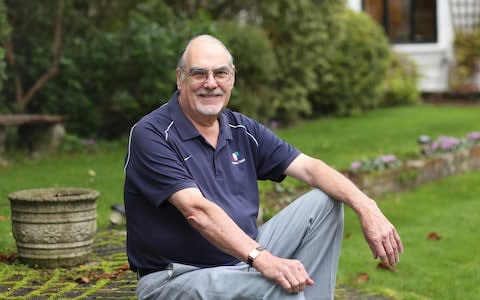How a drunken prank led to the creation of Wooden Spoon, the inspiring rugby charity giving youngsters a second chance


Nigel Timson has never been particularly good at rugby, but that has not stopped him from playing it for much of his life. The former Ernst & Young accountant has loved the camaraderie of the game ever since he ventured onto the rugby pitch at his Cheltenham public school in the Sixties, and he gets irritated when people suggest that rugby is an elitist sport, reserved for the middle and upper classes.
“I wasn’t a class-A player, by any means,” the 71-year-old says. “I was more interested in beer and going on tour than scoring tries. It was a great social life and I thoroughly enjoyed that. There is a view that rugby is elitist, whereas football is more general. I don’t think that’s fair at all. It developed through the public school system, and that’s probably why the view has arisen. I just think the fundamental culture of rugby is so different from football and other sports – it really is all about teamwork, camaraderie and having fun.”
It is precisely this esprit de corps that gives rugby the power to rebuild the lives of disadvantaged young people, says Timson, who is a trustee and one of the five founding members of Wooden Spoon, a charity that aims to “transform the lives of children and young people with a disability or facing disadvantage across the UK and Ireland through the power of rugby”.
The 36-year-old charity hands out around £1.3 million each year to dozens of local projects that support children and teenagers, building medical equipment, sensory rooms and playgrounds for youngsters with special needs.
This year, Wooden Spoon has been chosen by the Telegraph for its Christmas Charity Appeal, along with The Silver Line, which tackles loneliness among the elderly, and Leukaemia Care, which supports individuals and families affected by blood cancer and campaigns for faster diagnosis.
Wooden Spoon takes its name from a drunken afternoon in 1983 when Timson found himself on the receiving end of a particularly cruel practical joke. He does not pause or stumble over details as he recounts the story from the living room of his home, an 18th-century stable house near Maidenhead, Berkshire; it is clear he has told the tale many times before.
A lifelong fan of English rugby, Timson and four friends had arranged an impromptu trip to Dublin to watch England play Ireland in that year’s Five Nations Championship (it didn’t become the Six Nations until Italy joined in 2000). They were plunged into disappointment when England, then captained by rugger legend Bill Beaumont, suffered a 25-15 defeat, sending England to the bottom of the Five Nations table. Drowning their sorrows in Dublin’s generous selection of bars, they were at dinner with some Irish friends when the prank started to take form.
“Halfway through the meal, our Irish friends got up and left the table. We thought they’d gone to the toilet, but they didn’t come back and we thought they might have done a runner, leaving us to pick up the tab, which wasn’t very nice. Then after about ten or fifteen minutes we heard this rap on the table, and all the diners stopped and looked round. Our Irish friends walked through the restaurant with a big silver platter, and on it was a wooden spoon, which they presented to us in public.”
It was a reference, as rugby fans will have worked out, to the long-running legend of the Wooden Spoon, which is ceremoniously awarded to the loser of the Five Nations. (This year, the dreaded gift was given to Italy, who lost all five of their games.)
Returning home the next day, they found themselves on the same British Airways flight as the English team, plus the bulk of the Irish team, and managed to get every player on board to sign their wooden spoon, which was now a point of pride in the group. Six months later, they held a charity golf day at Farnham Golf Club in Surrey, raising £8,500, and The Wooden Spoon Society – later shortened to just “Wooden Spoon” – was born.
“We had an absolute blast, the whole thing just fizzed. It was fantastic. We drank Farnham Golf Club dry, we finished at two in the morning, and we had a huge amount of fun.” They decided not to sell the spoon, which is still on display at their office, and they had to change the charity’s initial strapline – ‘For Losers in Life’ – “when it became politically incorrect”, he says with a chuckle.
Of the five founders who were present at the charity’s Dublin inception, one has died and some have become ill, leaving Timson as the only active member. He recounts some of his fondest memories of the charity, including a visit from a beaming Princess Diana – “she was absolutely gorgeous, I have to say” – and a dinner with Princess Anne, who is the charity’s royal patron. Other high-profile patrons include women’s rugby star Maggie Alphonsi MBE, who is also a Telegraph columnist; England player Danny Cipriani; and former Welsh player Gareth Thomas, who in 2010 received Stonewall’s Hero of the Year Award when he became the first professional rugby union player to come out as gay.

The charity’s bread and butter is its mission to enlist young people who are not in jobs, education or training – referred to by government departments as NEETs, of which there are almost 800,000 in the UK – into community rugby squads, which helps to instill a sense of teamwork and purpose. Since 2013, nearly 16,000 11-to-19-year-olds have benefited from HITZ, an award-winning education and employability scheme developed by Premiership Rugby, which takes advantage of Wooden Spoon’s contacts within the highest levels of the sport to find jobs and education for the youngsters.
“Their whole background is one of isolation,” Timson says. “They don’t have a home life. They probably didn’t succeed at school, and they probably started off experimenting with drugs and all that sort of stuff. Their whole life is one of secrecy and isolation. Rugby takes you completely out of that, because it is necessarily a team sport.”
Many of the young players grew up in care or have lost contact with their parents, and in these circumstances the rugby club can serve as something as a family-in-lieu, according to Matt Mitchell, Wooden Spoon’s National Rugby Manager. “The community gives them a connection – it might with their tutor [on the HITZ scheme] or might be somebody else involved in the rugby community. They’re taken under their wing and looked after.”
As the son of two rugby-loving parents, and now the father of two rugby-loving teenage boys, Mitchell understands better than most the power the sport has to unite families; his own family’s local club – Tonbrige Juddians in Kent – acts as something of a second home. His wife, who he describes as a “rugby widow”, had no interest in the sport when they first met, but gradually developed an affection after coming to watch Mitchell practice every Saturday morning in the early years of their relationship. Now, she treks through the mud to watch her two sons practice.
More than other sports, Mitchell says, rugby has family and community at its heart. “Rugby clubs are typically local establishments. Some other sports don’t have a base – they’ll play and then they’ll just go to a pub, or even get changed on the side of the pitch – but rugby clubs are typically established buildings where there’s a bar and showers. After playing, you have a shower, get cleaned up, and then have a drink with your teammates before going home.” He also thinks the “physical nature” of the sport lends itself to a feeling of comradeship.
Timson is particularly proud of Wooden Spoon’s refurbishment of Stoke Mandeville Hospital in Buckinghamshire, which received some “very sophisticated equipment” to help disabled children communicate. They also built a hydrotherapy pool at a school in Pinner, on the outskirts of north-west London, which provides whole-body physiotherapy treatment, and the charity is working with Imperial College London to develop a “universal controller”, which will allow disabled children to control their lights, computer and television via a single device.

Just what is it about rugby that is so special, I ask? “It hasn’t become tainted in the way football has. It’s only been professional for a few years. The camaraderie, teamwork, friendship and fun all come together. It does rub off and kids pick that up, and suddenly they start talking to their peers, and they get the benefit too. There are very few problems with rugby crowds, or rugby spectators.
“I don’t think it’s the physical sport that’s relevant - I think it’s the mental culture.”
Wooden Spoon, which works with Britain’s rugby community to raise money for sick, disabled and disadvantaged children, is one of three charities supported by this year’s Telegraph Christmas Charity Appeal. Our two other charities are Leukaemia Care, which provides support to individuals and families affected by blood cancer; and The Silver Line, a 24-hour helpline and support service for lonely elderly people. To make a donation, visit telegraph.co.uk/charity or call 0151 284 1927


